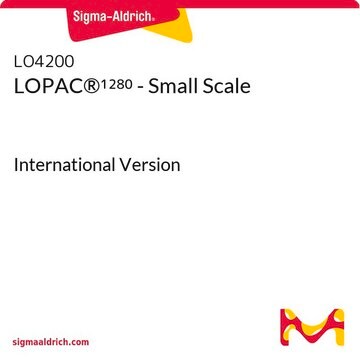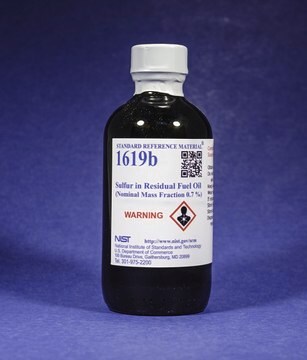LO4100
LOPAC®1280 - Small Scale
Synonym(s):
Library of Pharmacologically Active Compounds - small scale
About This Item
Recommended Products
Looking for similar products? Visit Product Comparison Guide
General description
Application
- in sprouting assay to screen potential lymphangiogenic inhibitors and the signaling pathways involved in lymphangiogenesis
- for identification of neuroactive compounds by measuring spontaneous activity within single zebrafish embryos by high-content screening assay
- for high-throughput Screen for ectonucleoside triphosphate diphosphohydrolase-1 (ENTPD1; also known as CD39) and ecto-5′-nucleotidase (CD73) inhibitors
Features and Benefits
- Apoptosis
- G Proteins & Cyclic Nucleotides
- Gene Regulation & Expression
- Ion Channels
- Lipid Signaling
- Multi-Drug Resistance
- Neurotransmission
- Phosphorylation
- Structure
- Primary Name
- Secondary Name
- Pharmacological Activity
- Product Number
- Rack Position
Other Notes
Legal Information
Signal Word
Danger
Precautionary Statements
Hazard Classifications
Acute Tox. 2 Dermal - Acute Tox. 2 Inhalation - Acute Tox. 2 Oral - Aquatic Acute 1 - Aquatic Chronic 1 - Carc. 1A - Eye Dam. 1 - Lact. - Muta. 1B - Repr. 1A - Resp. Sens. 1 - Skin Corr. 1B - Skin Sens. 1 - STOT RE 2 - STOT SE 2
Storage Class Code
6.1A - Combustible acute toxic Cat. 1 and 2 / very toxic hazardous materials
Flash Point(F)
188.6 °F
Flash Point(C)
87 °C
Choose from one of the most recent versions:
Already Own This Product?
Find documentation for the products that you have recently purchased in the Document Library.
Our team of scientists has experience in all areas of research including Life Science, Material Science, Chemical Synthesis, Chromatography, Analytical and many others.
Contact Technical Service










